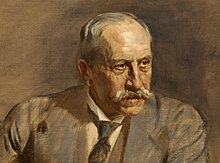Alfred Milner, 1st Viscount Milner
Alfred Milner, 1st Viscount Milner KG , GCB , GCMG , PC (born March 23, 1854 in Giessen , † May 13, 1925 near Canterbury ) was a British politician, High Commissioner for Southern Africa and Governor of the Cape Colony .
Life
Milner was born the son of a doctor whose parents had emigrated to Germany and the daughter of a British general. He studied in Tübingen and Oxford , where he graduated in 1877. In Oxford he made a close friendship with Arnold Toynbee, who died young . In the 1880s he worked as a journalist for the Pall Mall Gazette and unsuccessfully applied for a seat in parliament for the Liberal Party in the general election in 1885 . He then became personal secretary to George Goschen, who later became Finance Minister . In 1889 he went to Egypt as Undersecretary for Finance and returned to England in 1892 to take over the chairmanship of the Board of Inland Revenue . The efficient and tight administration of Egypt by the British Consul General Evelyn Baring would later become Milner's model for his activities in South Africa.
In 1897 he was appointed Governor of the Cape Colony and High Commissioner for Southern Africa by Colonial Minister Joseph Chamberlain . His predecessor, Lord Rosmead , had to resign as a result of the worsening situation there after the unsuccessful Jameson Raid . Milner became a sharp opponent of the President of the South African Republic in the Transvaal , Paul Kruger , who wanted to secure the rights of the native Boers by all means over the increasing numbers of Uitlanders in the gold fields of the Transvaal. The failure of an agreement on the Uitlander question led directly to the Second Boer War from 1899 to 1902, in which the British were victorious over the Boers after a hard fight. In 1901 Milner was appointed administrator of the Boer republics annexed at that time. Together with Lord Kitchener he was one of the signatories of the Vereeniging Peace Treaty , which ended the war with guarantees for the defeated Boers. Then he paved the way for Asian piecework workers to resume mining in South Africa's gold mines. In 1905 he retired from his post in South Africa. During a visit to England in 1901, Milner was made a hereditary peer as Baron Milner , of St James's in the County of London and of Cape Town in the Colony of the Cape of Good Hope, and was made hereditary peer the following year on July 15 1902 to Viscount Milner , of Saint James's in the County of London and of Cape Town in the Cape Colony, raised.
In London, Milner became chairman of the board of the Rio Tinto Company , which he was to remain until his death. As a result, he focused on the development of ideas for the renewal of the British Empire on the basis of a free association of the European-dominated Dominions . During his time in South Africa, he fell out with the Liberals and strictly rejected their ideas about free trade . He became a leading advocate of imperialism , advocated tariff reform based on the Imperial Preference model, and founded the Round Table Movement in 1909 together with a number of former employees (see Milner's Kindergarten ) . In 1916 he was included by David Lloyd George as Minister without Portfolio in his War Cabinet . He is considered to be the initiator of the Balfour Declaration of 1917. In 1918 he was briefly Minister of War and after the khaki elections in the same year he became Secretary of State for the Colonies . In this capacity he took part in the Paris Peace Conference in 1919 and was one of the signatories of the Versailles Peace Treaty with the German Empire. Between 1919 and 1920 he worked out recommendations for the future relationship between Great Britain and Egypt. In 1921 he resigned and married his long-time lover, the now widowed Violet Cecil, whom he had met during the Boer War. In 1925 he died of sleeping sickness . The title Viscount Milner expired because he remained without a male heir.
literature
- Alfred Milner: England in Egypt , London 1894 ( digitized version ).
- Terence O'Brien: Milner: Viscount Milner of St. James's and Cape Town, 1854-1925. Constable, 1979.
- J. Lee Thompson: Forgotten Patriot: A Life of Alfred, Viscount Milner of St. James's and Cape Town. Fairleigh Dickinson University Press, 2007.
- Ders .: A Wider Patriotism: Alfred Milner and the British Empire. Pickering & Chatto, 2008.
- Hendrik L. Wesseling: Divide and rule: the division of Africa 1880-1914 , Franz Steiner Verlag, Stuttgart 1999, ISBN 3-515-07543-7 .
Web links
- Alfred Milner on firstworldwar.com
- Alfred Milner on sahistory.org.za
- Catalog of the papers of Alfred Milner, Viscount Milner, 1824-1955 at the Bodleian Library , University of Oxford
- Newspaper article about Alfred Milner, 1st Viscount Milner in the 20th century press kit of the ZBW - Leibniz Information Center for Economics .
| predecessor | Office | successor |
|---|---|---|
| Hercules Robinson, 1st Baron Rosmead | Governor of the Cape Colony and High Commissioner for South Africa 1897–1901 |
Walter Hely-Hutchinson |
| Edward Stanley, 17th Earl of Derby |
Secretary of State for War 1918-1919 |
Winston Churchill |
| Walter Long, 1st Viscount Long |
Secretary of State for the Colonies 1919-1921 |
Winston Churchill |
| personal data | |
|---|---|
| SURNAME | Milner, Alfred, 1st Viscount Milner |
| ALTERNATIVE NAMES | Milner, Alfred Milner 1st Viscount |
| BRIEF DESCRIPTION | British politician, High Commissioner for South Africa and Governor of the Cape Colony |
| DATE OF BIRTH | March 23, 1854 |
| PLACE OF BIRTH | to water |
| DATE OF DEATH | May 13, 1925 |
| Place of death | at Canterbury |

